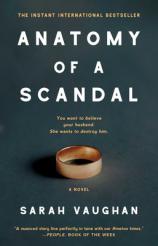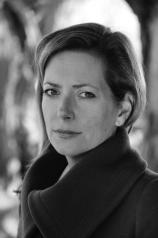Interview: January 26, 2018
Once a political correspondent herself, author Sarah Vaughan is no slouch when it comes to knowing what goes on behind the scenes in the world of politics. Her third and latest novel, ANATOMY OF A SCANDAL, reflects that understanding, shedding light on how power corrupts, how secrets and grudges take root, and how we navigate the dangerous landscape of sexual politics. In this interview conducted by Carol Fitzgerald, the president and co-founder of The Book Report Network, Vaughan discusses where and when her ideas emerged, the challenges she faced in embracing the first-person point of view for the first time, and, of course, politics.
Bookreporter.com: When you were writing ANATOMY OF A SCANDAL, it seems impossible that you could have known how timely the subject of this book could be. What was the germ of the idea for it?
Sarah Vaughan: I dreamed up the plot back in November 2013, just after a footballer, Ched Evans, was refused leave to appeal against his rape conviction. (He subsequently has been re-tried and acquitted.) The newspaper coverage bothered me --- in particular, a column in which a young woman was quoted as saying that the 19-year-old victim was hardly going to his hotel room “for a cup of tea and a game of Scrabble.” It made me think about how we judge women in rape cases and of how exposing and damaging a rape trial must be. I also began to think about how difficult it can be to navigate sexual politics and how I hoped the situation would improve for my daughter, then eight (and son, then five). It was three years before the Harvey Weinstein revelations broke, but the issue of consent --- and the danger of powerful men --- was something that was in the ether, and that bothered me.
BRC: The story is told from various points of view, and each chapter is dated. Was this always the format, or did that evolve as you were writing?
SV: I knew from the start that I wanted to write about a barrister who would prosecute a junior minister accused of rape --- and, having read seven books on the trot with an unreliable first-person narrator, I wanted to try doing this as well. But I didn’t just want to write from the first person: I thought that would be too restrictive for a multi-layered story in which the truth means different things to different people and everyone is busy weaving their own narrative. It didn’t take long for me to work out that I wanted the wife’s point of view to be important as well, and that James’ viewpoint of crucial scenes was also inevitable. Then I gave another couple of characters their point of view, too. Dates are important because the novel features an Oxford story that takes place 24 years earlier. I’d played with dates 70 years apart in my previous novel, so I suppose I dated the chapters --- and named the characters voicing each --- for clarity.
BRC: I believe this is the first time that you have written a book with a character’s voice in first person. Kate felt to me to be empowered by this. What were the challenges of that?
SV: It is the first time I’ve done this, yes, and I found it hugely liberating. Kate is outwardly a confident, professionally successful woman, but she’s also thoughtful and introspective. Her job requires her to be a powerful advocate, and so nailing her voice seemed particularly important. I shadowed a barrister in two sexual offenses cases while writing this, and so I imbibed the cadences and rhythms of speech used in the court. The challenge was not in writing her but in ensuring that I didn’t privilege her too much --- that there was also sympathy for James’ wife, Sophie, whose POV is in the third person.
BRC: Was Kate easier to write than the others? And is there a character who was more of a challenge?
SV: Yes, she was easier to write --- partly because she’s the character I’ve created who’s the most like me, and partly because she seemed so distinctive. I loved creating a bright woman with a very definite public persona. Sophie was more of a challenge because in some ways she seemed anachronistic: the good wife who gives up so much --- her job, her sense of self --- to stand by her man. And yet there was much that I could identify with in Sophie. My family --- husband and two children --- are the center of my world, and, like Sophie, having experienced my parents’ divorce, I can understand why she wanted to avoid that happening to her children.
BRC: Sophie notes that as a government minister, her husband has “a willingness to be economical with the truth” and that this is “a prerequisite, even, to being a government minister.” Did this idea come to you during your years as a journalist?
SV: Yes. It probably sounds horribly cynical, but I think that, with a few politicians, there is a willingness to manipulate the truth a little even if it’s only through omission. I worked as a political correspondent when the now-Foreign Secretary Boris Johnson was revealed to have had an affair --- something he memorably dismissed as “an inverted pyramid of piffle.” By the following week, he had to admit that it was true. He’s quite an extreme example. But you can see with double accounting with budget figures, for example, or the releasing of controversial news at unsociable times --- one minute past midnight on New Year’s Day being a recent example --- that politicians are not always completely upfront.
BRC: “The story’s about to break” is a line that comes at the end of the second chapter. While a story can be shared between a husband and wife, and then brought to a larger circle, it takes on a whole new tone when it becomes news and takes on a whole new life. From there, people come on board to help “manage” the story and mitigate the damage. Do you think we are seeing this more and more today, or does it just feel that way?
SV: Yes, completely. Twenty-four-hour news and the invention and burgeoning of social media means that news stories develop at a far faster pace these days. News management becomes paramount. I worked in the lobby from the start of the Iraq war (March 2003) until January 2005, and earlier in 2000-1, and so I saw the impressive Downing Street machine, headed by Alistair Campbell in action. I think the current UK government lacks that slickness --- as you can see from inaccurate tweets. And as for the US administration? Donald Trump’s tweeting seems to undermine attempts to manage the news --- and often becomes it.
BRC: There is a lot at play here about power and the relationship between those with and without it. It was interesting to see the way the Prime Minister handled the relationship with his friend, stepping away when the story was too hot. Was this a theme you set out to explore, or did it evolve in the course of your storytelling?
SV: Power is absolutely integral to this novel. Abuse of power is key, and from the start I knew I wanted to “max it up” and deal not only with an MP but with powerful men in the highest positions of authority. Before I started writing, I asked my former political editor how a prime minister would react if a minister who was also a very close friend was accused of something so heinous. So my PM's (Tom Southern’s) public distancing --- and his innate ruthlessness --- was inspired by his advice.
BRC: There is a lot of sympathy for all the women in this book, and the way they have been wronged by men. The lack of true remorse and entitlement by the men is stunning. Do you think that we are about to embark on a time when apologies will be more real, or even that apologies will not be required as people will think more about how they handle relationships? What happens when power becomes equal?
SV: I hope we’re now at a watershed moment --- but I think it’s going to take several years before we see widespread cultural change. I think we’re a very long way off from a situation in sexual politics in which there is no need for apologies.
BRC: The idea of holding onto grudges, as well as secrets, is critical to the story. There are twists and turns. Did you map those out in advance?
SV: Yes. The idea for the novel came to me in a dream with the key twist in it. A few of my original twists had to be discarded, and I wrote the final chapter with less ambiguity only after I thought it was finished. But I plotted this in more detail than previous novels, and the key points were there from the start.
BRC: The title works on so many levels. Did you have that before you started writing, or when was that nailed?
SV: Interestingly I only came up with the title after I had finished the first draft. My agent had suggested a title, but because I hadn’t thought of it myself I didn’t like it. I had met with Terry Stiastny, a fellow author and former political correspondent, who had read it, and she was explaining it to a friend. “I suppose really it’s an anatomy of a scandal,” she said. And I had a light-bulb moment. I think it works in every country it’s been sold to --- and it’s being translated into 19 languages, as well as published in the UK, Australia, Canada, South Africa, India and the US.
BRC: What are you working on now, and when can readers expect to see it?
SV: My fourth novel, which, all being well, will be published in January 2019.




